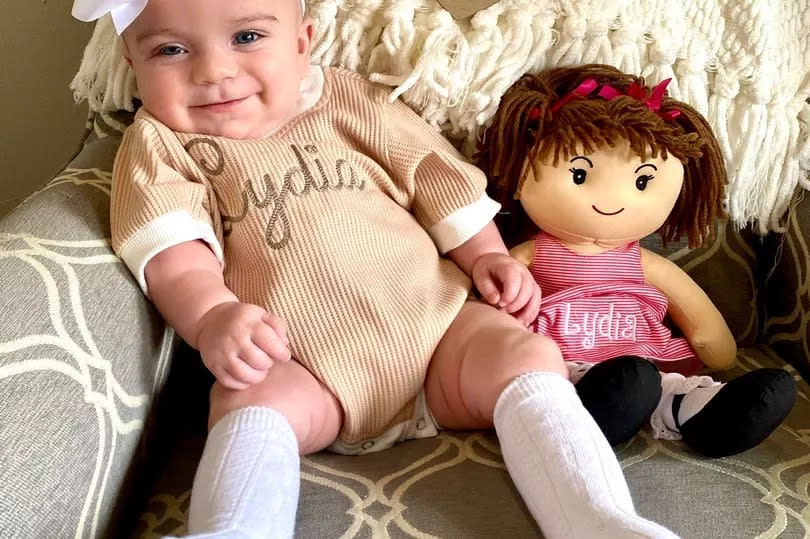My perfect baby was diagnosed with Alzheimer's after I saw a TikTok

A mum's world was turned upside down when her "perfect" little girl was diagnosed with the devastating childhood Alzheimer's, following a chance encounter on TikTok. Morgan Rachal, 29, was ecstatic to welcome her second daughter, Lydia, who is now 20 months old, believing she was in perfect health despite occasional ear infections, constipation, and sleep issues.
However, Morgan's mother, Cindy Weaver, 55, stumbled upon a TikTok video of a girl who bore a striking resemblance to Lydia, shared similar symptoms, and suffered from a rare condition known as Sanfilippo syndrome. Children affected by Sanfilippo syndrome often have distinctive facial features such as full lips, heavy eyebrows that meet over the nose, or hirsutism, which is excessive hair growth.
After showing the clip to her doctor, tests confirmed that Lydia had Sanfilippo syndrome type B. This disorder, often referred to as childhood Alzheimer's, leads to a loss of all acquired skills as it progresses.
Read more: New GP rules
While Lydia has not yet shown cognitive decline, without treatment, her condition will deteriorate. Morgan is determined to enrol Lydia in a clinical trial, as there is currently no cure for Sanfilippo.
Reflecting on the birth of her daughter, Morgan, a nurse from Natchitoches, Louisiana, USA, recalled: "The doctor said the words 'she's perfect' when she was born. She was hitting all her milestones.
"In March, my mum found a TikTok called the saving Liv TikTok. They looked like twins. My mum said she looks just like Lydia. I started looking more into the syndrome.
"It was the worst day ever [when Lydia was diagnosed]. It's very heart breaking."
Morgan, along with her husband Kirk, 34, a contractor, joyfully welcomed little Lydia into their family in October 2022. Lydia had a big sister; Morgan and Kirk already had Heidi, five.
Like many parents of a new baby, they weren't overly concerned about Lydia's frequent ear infections, or the fact she seemed constipated and could never sleep through the night. Morgan explained: "She had frequent ear infections. She was constipated. She never slept through the night."
Sentiments echoed by many a new mother, things that all babies go through. Morgan added: "I wasn't looking at anything wrong. I was never worried about anything."
But life took an unexpected turn when her mum spotted a TikTok video of a little girl who looked eerily like Lydia - right down to the same thick eyebrows a characteristic feature of Sanfilippo syndrome. Morgan recalled: "My mum showed me the TikTok. I immediately thought she looks like my child's twin."
When Morgan discussed this with her paediatrician, he agreed the little girls did bear a striking resemblance, leading to various tests being arranged. "Within a week," Morgan revealed, "the tests came back positive."
The results sent Morgan spiralling into despair. She admitted: "When I found out I was in a really dark place."
Further analysis led them to discover it was type B the result of a defect in the NAGLU gene. Morgan said : "They don't start to regress until aged three or four."
At the moment, Lydia knows around 20 words. Being perhaps blissfully unaware of her fate, Morgan observes: "She's the happiest baby."
The brave mum is doing everything within her power to secure her beloved daughter a place on a clinical trial, in the hope that a treatment may be found. Describing the devastating prospect of her daughters future, she said: "They call it childhood dementia."
As tears formed in her eyes, she added: "She won't be able to walk, or talk. She won't make it through the third decade of life. Her joy right now will be taken away if she doesn't get into treatment."
Morgan expressed her gratitude that her mum noticed the TikTok video, which led to an early diagnosis: "I'm grateful we were able to get the diagnosis early."
She added with concern, "I wouldn't have known until the brain damage started happening."
Determined to make a difference, Morgan is keen on raising awareness about the symptoms so other children can also receive early diagnoses and to support research into finding a cure.
Describing her daughter, she said: "She is a little ray of sunshine. She blows kisses. She is a little bundle of joy."
Emphasising Lydia's normalcy, Morgan stated: "She's a normal baby."
To contribute to Morgan's fundraising efforts for a clinical trial, you can donate here.

 Yahoo News
Yahoo News 
